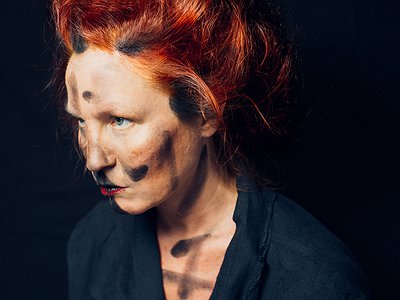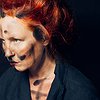Could you describe your creative process on the basis of a piece or album that's particularly dear to you, please? Where did the ideas come from, how were they transformed in your mind, what did you start with and how do you refine these beginnings into the finished work of art?
Okay, I choose "System Immanent Value Defect", a track from my second album "I Started Wearing Black". There is Elif, my student friend. She is a pianist from Istanbul. I witnessed her suffering from the political circumstances in her country. How she felt guilty for being safe in Germany while things are getting worse at home. I wanted to write a track for her. This explains why the working title was "I See Turkey". I started thinking about politics, cultural perspectives ... and I realised that there is no country, no political system in our world today that really puts its people first. So the title changed.
Music wise it was clear for me I wanted a piano part in the track, dedicated to Elif. I composed something, I recorded it at my home, I treated it to sound like an old memory carried by the wind. Furthermore, I worked with a wave o white noise which is a metaphor for the sea, here a symbol for international politics today. The strong wall of sound and the beats represent the urgency of the topic, and the heaviness that it is causing to those who suffer.
There are many descriptions of the ideal state of mind for being creative. What is it like for you? What supports this ideal state of mind and what are distractions? Are there strategies to enter into this state more easily?
I am an early bird, no night owl. The perfect scenario for me to work is to wake up after a long, good sleep, get out of bed, make a coffee and start making music right away. In my pyjama. Any contact to real-life topics means a distraction and can kill my creativity. If nothing is disturbing me, I can keep this morning-feeling and a deep concentration for many hours. Usually I finish work around 3 or 4 pm.
How is playing live and writing music in the studio connected? What do you achieve and draw from each experience personally? How do you see the relationship between improvisation and composition in this regard?
When I started playing live I very soon had to realise how much effort it takes to adapt an electronic music piece into a live performance version. Today I already realise what is possible on stage and what isn't while producing. Sometimes I grab a pen and make notes before continuing with the production, to keep ideas or technical details for later live adaptions.
How do you see the relationship between the 'sound' aspects of music and the 'composition' aspects? How do you work with sound and timbre to meet certain production ideas and in which way can certain sounds already take on compositional qualities?
Maybe this is something that is specific for electronic music, but in this kind of music, all sound aspects are composition aspects. Each decision you make affects other parameters, especially the mixing is strongly affected and parts of the composition itself. So for my work, all levels of production are relevant and happen in a symbiotic work flow.
Our sense of hearing shares intriguing connections to other senses. From your experience, what are some of the most inspiring overlaps between different senses - and what do they tell us about the way our senses work? What happens to sound at its outermost borders?
I can only speak for myself as I never really learned about this phenomenon. Typical for me is the connection between my body, my dance education and sound. I cannot listen to music without moving, and I am always wondering how people can sit or stand around during a concert without moving. And I start smiling all over my face when I agree with an artistic performance. I also recognised that I am highly attracted to singular sounds of high tension, like in the work of Emptyset or Thembi Soddell. Speaking of "sound at its outermost borders", I go literally crazy if you let me hear a strong, focussed sound which bundles so much energy that it sums up to a physical experience.
Art can be a purpose in its own right, but it can also directly feed back into everyday life, take on a social and political role and lead to more engagement. Can you describe your approach to art and being an artist?
The most important value for me as an artist is honesty. I am trying to deliver the most honest work I have to give right now, even it may mean that some people don't like it, don't understand it, throw eggs or bottles. I don't allow myself to try to be popular. I consider my artistic task to develop my own musical vocabulary which implicates critical reflection of the genre and context I am moving in. Questioning the parameters of electronic music today, developing something - hopefully - new. Electronic music always had the ability to be different, to bare listening and celebrating experiences - and to represent those who felt "different" in their society. I want to continue this idea and translate it, bring it to a level that suits today, that's really now. I seriously don't understand how we can agree to a nostalgic repetition of old motives. Don't we have a mission?
It is remarkable, in a way, that we have arrived in the 21st century with the basic concept of music still intact. Do you have a vision of music, an idea of what music could be beyond its current form?
Thanks for this question, one hundred percent referring to what I've been speaking about above! Yes, after years of thinking and floating I kind of have a vision, and I am constantly working on it ... my current live set and my latest mix for The Wire is a bit of what I am trying to reach.



